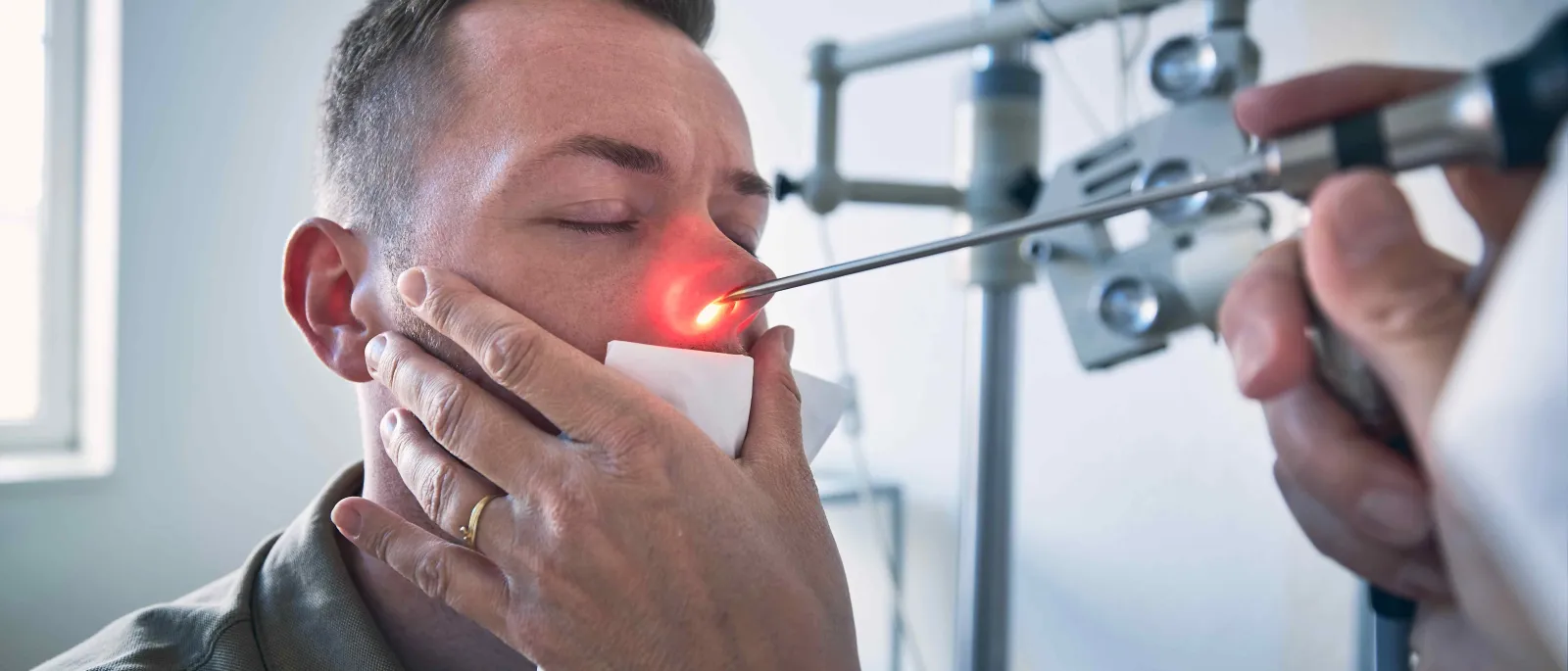A sinus infection can be unpleasant enough, but chronic sinusitis can leave you feeling utterly drained - both literally and figuratively. The condition can interfere with your sleep, work, and overall quality of life, making effective treatment all the more important.
Fortunately, while an ENT doctor may recommend surgery in some instances, it's often possible to manage the condition with a non-invasive treatment plan that emphasizes long-term symptom relief.
If your sinuses have been inflamed for weeks on end and you're wondering how to get rid of chronic sinus infection, the following guide will walk you through the lifestyle changes and medication that may help bring you relief.
What Is Chronic Sinusitis?
Chronic sinusitis is a condition where your sinuses remain swollen and inflamed for longer than 12 weeks. Unlike acute sinusitis, which typically resolves within a week or two, chronic sinusitis can last for months, with symptoms often improving and then worsening.
Symptoms are often similar to those of acute sinusitis, including nasal congestion, facial pain or pressure, and postnasal drip.
Some of the most common causes of chronic sinusitis include:
- Allergies
- Asthma
- Infections
- Sinus polyps: Small growths in the nasal passages that can obstruct airflow and mucus drainage
- Structural issues (such as a deviated septum): Can narrow the nasal passages, making proper drainage difficult
An ENT doctor can help identify what the cause of your particular case of chronic sinusitis may be.
Non-Surgical Treatment for Chronic Sinusitis
While chronic sinusitis can have a real impact on your day-to-day wellbeing, the good news is that non-surgical treatments can often offer relief. An ENT doctor can give recommendations to help you clear blockages, reduce inflammation, and eliminate environmental triggers that may be exacerbating the condition.
Depending on your particular case, your treatment plan may include the following:
Saline Irrigation
Regularly rinsing out your nasal passages with a saline solution can flush out mucus, irritants, and bacteria while also reducing inflammation. Neti pots and squeeze bottles are both effective and may be recommended in conjunction with stronger forms of treatment.
Always use sterile, distilled, or previously boiled water when rinsing, as you don't want to introduce new bacteria to a compromised immune system.
Nasal Corticosteroids
A type of prescription-strength nasal spray, nasal corticosteroids help reduce inflammation that may be present. When used alongside saline irrigation, they offer an effective form of symptom control to most patients.
Allergy Management
Allergies are a common cause of sinus issues for many people, with over a quarter of the U.S. population suffering from seasonal irritants. If your allergies are regularly impacting your sinuses, an ENT doctor can help create a targeted plan to address both the allergies and their sinus-related impact.
A treatment plan for allergy management may include antihistamines, allergy testing, and long-term desensitization through immunotherapy.
Antibiotics and Antifungals
Acute sinusitis is usually viral and resolves on its own, but chronic cases may feature bacteria, which can lead to worsening inflammation. In these instances where a bacterial or fungal infection is confirmed, a physician may prescribe antibiotics or antifungal medication.
How to Get Rid of Sinus Polyps Without Surgery
As mentioned, sinus polyps are soft, noncancerous growths that can form in your nasal passages or sinuses. They often develop from long-term inflammation, which makes people with chronic sinusitis extra susceptible to them. Those with seasonal allergies are often more likely to develop them.
Although an ENT physician may recommend surgery to remove large and stubborn polyps, medicine can often help to eliminate small to moderate ones. Options include:
- Nasal corticosteroids: Work to reduce inflammation and shrink the polyps
- Oral steroids: Used in the short-term to quickly reduce inflammation levels
- Biological medications: Helpful for patients with severe inflammation or an underlying condition like asthma
If you're wondering how to get rid of sinus polyps without surgery, meeting with a knowledgeable ENT physician as soon as possible is key. They can visualize, diagnose, and help treat the polyps - often before surgery is needed.
When to Consider Surgery for Chronic Sinusitis
If medication and lifestyle changes don't bring you the necessary relief, your ENT doctor may recommend endoscopic nasal polyp surgery as a next step. Minimally invasive, this procedure works to remove blockages like nasal polyps and swollen tissue while reshaping your nasal pathways to improve drainage and airflow.
Physicians often recommend endoscopic nasal polyp surgery when chronic sinusitis is caused by structural issues or recurring infections that don't respond to medication. The procedure is an outpatient operation, meaning you can return home that same day. The recovery process is usually quick, with most patients improving within several days.
To prevent recurrence, post-surgery care often includes continued nasal irrigation and use of corticosteroid sprays.
Partner With ENT of Georgia South
Managing a stubborn and deep sinus infection often requires persistence and a personalized approach. At ENT of Georgia South, our team of experts can offer you the comprehensive care you need to find relief without unnecessary surgery.
If you're ready to stop living with chronic sinus issues, contact us today to schedule a consultation. No matter how long you've had the condition, we're here to answer questions, offer expert care, and help you breathe easier.

